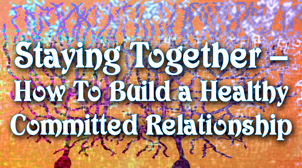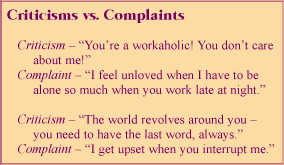
 hen we make a commitment to our partner, our usual expectation is that our relationship will last for life and that our love will see us through the inevitable hard times. Yet, when reality sinks in, we have to acknowledge that while love is one of the components of a relationship's longevity, it really takes more to make it through the long haul. It takes community and family support (which isn't as available as it once was in our society) - and it takes skill. Many of us have failed to learn how to negotiate our way through relationship difficulties to build a lasting connection. hen we make a commitment to our partner, our usual expectation is that our relationship will last for life and that our love will see us through the inevitable hard times. Yet, when reality sinks in, we have to acknowledge that while love is one of the components of a relationship's longevity, it really takes more to make it through the long haul. It takes community and family support (which isn't as available as it once was in our society) - and it takes skill. Many of us have failed to learn how to negotiate our way through relationship difficulties to build a lasting connection.
Psychologists have carried out substantial research over the past several decades trying to understand the secrets of why some couples are able to stay together and others are not. For instance, John Gottman, Ph.D., at the University of Washington, has studied over 2,000 couples, and he has had remarkable success in predicting which couples will make it and which will not. Contrary to popular wisdom, one of his findings is that increased sex does not necessarily improve a relationship. He also found that financial problems do not always imply trouble for a couple.
One of Gottman's major findings is that couples who fight are not necessarily on the road to a breakup. In fact, he makes the point that arguments may be constructive in building a long-term relationship because they help us to clarify our needs and increase mutual respect between partners. But whether the arguments will lead to a breakup or not depends on how the couple resolves its conflicts. There are positive ways to resolve conflicts that may strengthen the relationship.
|
|
|
| |

Kim Jones, MA, MFT
Marriage and Family Therapist
License #: MFC37708
9330 Carmel Mountain Road
Suite C,
San Diego, CA 92129
(858) 204-2599
www.kimjonescounseling.com
Services
. Individual . Adolescent
. Family .
Marriage Counseling
My focus is to help you make a difference in your life. If you are in a marriage seeking support or a parent seeking counseling for your child or adolescent, I specialize in counseling relationship issues. I have expertise with adolescents and children and I work together with families to address specific behavioral and emotional difficulties and improve family connections. I also work with individuals and couples to help enhance and improve their relationship skills.
As a therapist for ten years, I also have experience owning a business and working as a teacher and counselor in the school systems. I have developed and provided training programs to parent groups and teachers and I also am a mother to three wonderful children. My hopes are to inspire, guide, and teach each family member to make connections and a positive difference in their life.
My office is centrally located off the 56 freeway in San Diego. Weekday, evening, and some weekend hours are available.
Call (858) 204-2599
for an appointment.
|
|
|
One finding to emerge from the research is that couples
 are likely to succeed if they have a healthybalance between
are likely to succeed if they have a healthybalance between
positive and negative emotions and interactions.In fact, strong relationships have a five to one ratio - five parts positive interaction to one part negative.Couples who break up, on the other hand, tend to have more negative than positive interactions.
Positive Behaviors in a Relationship
What are these positive interactions? They are found in
- Showing interest in what your partner is saying,
- Expressing affection to your partner both verbally ("I love you") and nonverbally (holding hands, doing kind little things),
- Showing you care - perhaps by making a phone call during the day or bringing home flowers,
- Showing appreciation by remembering the good times in your relationship or telling your partner how proud you are of him or her,
- Indicating your concern - instead of acting defensive, show that you are concerned about your partner's troubling experiences or apologize if you say something hurtful without thinking,
- Conveying empathy in your facial expression and verbal feedback - show that you truly care about what your partner is going through,
- Displaying acceptance of your partner's thoughts and feelings - this shows your respect for your partner,
- Joking around, which includes playful teasing, laughing together, and maybe acting silly together, and
- Sharing your joy when good things happen.
The Negative Cascade
A relationship in trouble is one that falls into a negative cascade. One negative reaction leads to the next until there is a seemingly insurmountable wall between the two partners. Relationships that enter this destructive phase need attention and can benefit from the trustworthy, confidential intervention of a professional therapist. Sometimes the two partners fail to notice when they have entered this cycle because they feel justified in reacting as they do - but the price they pay is the slow erosion of their relationship. It may seem impossible for them to recapture the love that brought them together in the first place.
Here are the phases of the negative cascade -
Criticism
Criticism involves attacking your partner's personality or character, not just his or her behavior. There is usually an element of blame in the attack. Criticizing your partner leads to defensiveness and may encourage your partner to withdraw from you - after all, if your partner feels blamed because of a personality flaw, it would be difficult thing to repair. A complaint, on the other hand, especially if it is stated as an "I-statement," is an expression of your feeling that allows your partner to correct the situation. Stating a complaint, though it may not be pleasant, can enhance the relationship because it gets problematic behavior out in the open where it can be talked about. Complaints often begin with the word, "I," and criticisms might begin with the word, "you."
 To repair this pattern, try stating your criticisms as complaints that your partner can respond to and not take as a personal attack. Make your complaints specific and talk about them as a behaviors that can be changed. Take responsibility for your own part in the problem. To repair this pattern, try stating your criticisms as complaints that your partner can respond to and not take as a personal attack. Make your complaints specific and talk about them as a behaviors that can be changed. Take responsibility for your own part in the problem.
Contempt
If the criticisms within a relationship are not addressed, the interaction between the two partners may lead to contempt. This stage of the negative cascade is seen when there is an attempt to insult your partner, as in, "You're just a pig around the house and I don't know how I could ever have loved you." Contemptuous remarks go right to
the heart of your partner's sense of self. They are meant to hurt. There are several forms of contempt, such as name-calling, insulting jokes about your partner, mockery, and body language (such as sneering, eye rolling, or curling your upper lip). If a relationship gets to this stage, it is difficult to recapture the love and it may be vulnerable to a breakup.
To make this situation better, both partners need to identify the contempt and to replace it intentionally with words of admiration and respect. They need to work on trying to achieve the ratio of five positives to one negative.
Defensiveness
 When a person is bombarded with criticism and indications of contempt, it is natural to feel like a victim - and victims go into a defensive posture ("I haven't done anything wrong, so stop picking on me"). Defensiveness is an attempt to protect oneself and to guard against further attacks. The victim feels justified in doing this. However, what is not often understood is that defensiveness tends to escalate a conflict rather than quelling it. The partner who does the blaming feels that the other one doesn't "get it" and is resistant to addressing the problem. This can result in a standoff where constructive communication comes to a halt. Rather than trying to mutually solve the problems in the relationship, the two partners spend their energy defending themselves. Nothing is resolved, the conflict escalates, and the negative cascade continues to damage the relationship. When a person is bombarded with criticism and indications of contempt, it is natural to feel like a victim - and victims go into a defensive posture ("I haven't done anything wrong, so stop picking on me"). Defensiveness is an attempt to protect oneself and to guard against further attacks. The victim feels justified in doing this. However, what is not often understood is that defensiveness tends to escalate a conflict rather than quelling it. The partner who does the blaming feels that the other one doesn't "get it" and is resistant to addressing the problem. This can result in a standoff where constructive communication comes to a halt. Rather than trying to mutually solve the problems in the relationship, the two partners spend their energy defending themselves. Nothing is resolved, the conflict escalates, and the negative cascade continues to damage the relationship.
The way to address the defensiveness phase of the cascade is to learn how to stay calm. When anxiety is reduced, it is possible to ward off criticism, put it into perspective, and avoid reacting defensively. It is helpful to learn how to react to the overall situation rather than to only the words that are spoken in moments of conflict. Staying calm protects us against the possibility of feeling overwhelmed during heated moments.
Stonewalling
In the final phase of the negative cascade the couple finally breaks off normal contact. Gottman found that 85 percent of stonewallers are men. This phase characterizes a stage in the damaged relationship where one of the partners decides that no communication is better than the destructive feelings and words that have prevailed prior to this point. Withdrawing from interaction sends a powerful negative message - and the stonewaller may feel that this is the only option left. It is important to note that a common fighting technique between partners is for one to use the "silent treatment" - but this is not the same as stonewalling. The silent treatment is used on occasion, while stonewalling is an habitual reaction for the couple and is preceded by the first three phases of the negative cascade. Relationships that get to this point are still salvageable, but they are fragile. At this stage, the couple must want to work hard to save the relationship.
In order to address the problem of stonewalling, the couple should address issues like learning to stay calm, speaking nondefensively, and becoming aware of the thoughts that maintain their distress. A therapist can help a couple learn all of these skills.
Making Positive Relationship Changes
There is still hope for couples who find themselves in destructive patterns, but they must learn new skills. Consulting with a trained therapist is generally the most effective way to do this.
One skill to learn is how to avoid flooding, which is a feeling of being overwhelmed by your partner's negativity and your own reactions. In flooding, you feel that you have reached your limit and can take no more. A person who experiences flooding feels hostile, withdrawn, and defensive. This person feels the need to calm down and may feel like running away from the situation just to get some relief. A therapist can teach the partners how to stay calm in these situations and to use positive thinking techniques. Both partners also need to redefine the attacks on them as simply the way the other person is trying to make a point.
 Arguments are not necessarily a sign that the relationship is in trouble. In fact, conflict is a way to clarify our expectations about our role - and our partner's role - within the relationship. This clarification allows both partners to feel comfortable and secure. The couple needs to know that they can trust each other. Mutual respect can emerge out of productive arguments. Making conflicts constructive is a skill that can lead to a lifetime of love, intimacy, and the experience of knowing that you are cherished by an important person in your world. Arguments are not necessarily a sign that the relationship is in trouble. In fact, conflict is a way to clarify our expectations about our role - and our partner's role - within the relationship. This clarification allows both partners to feel comfortable and secure. The couple needs to know that they can trust each other. Mutual respect can emerge out of productive arguments. Making conflicts constructive is a skill that can lead to a lifetime of love, intimacy, and the experience of knowing that you are cherished by an important person in your world.
Recommended Reading
John Gottman, Why Marriages Succeed or Fail.
New York: Simon and Schuster, 1994.
Paperback, $14.00, 234 pages.
ISBN-13: 978-0-684-80241-1. |
|

